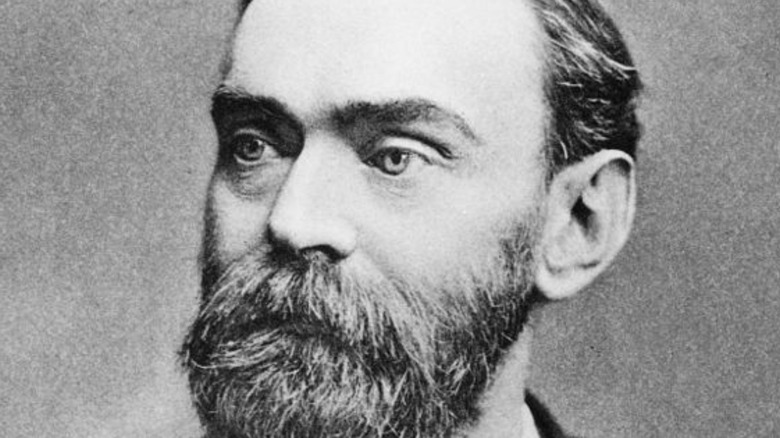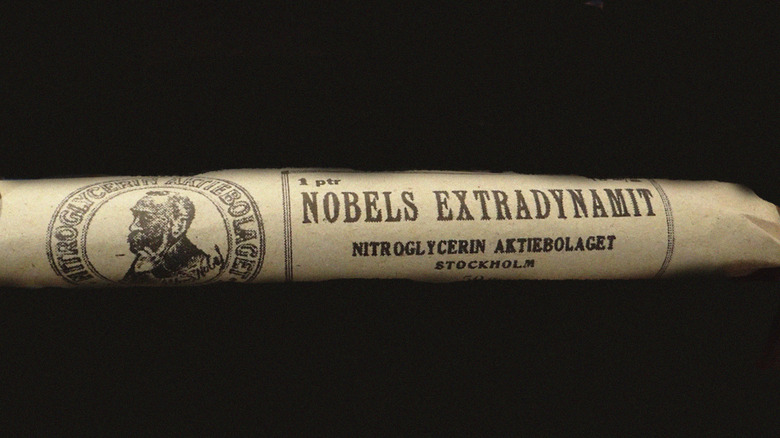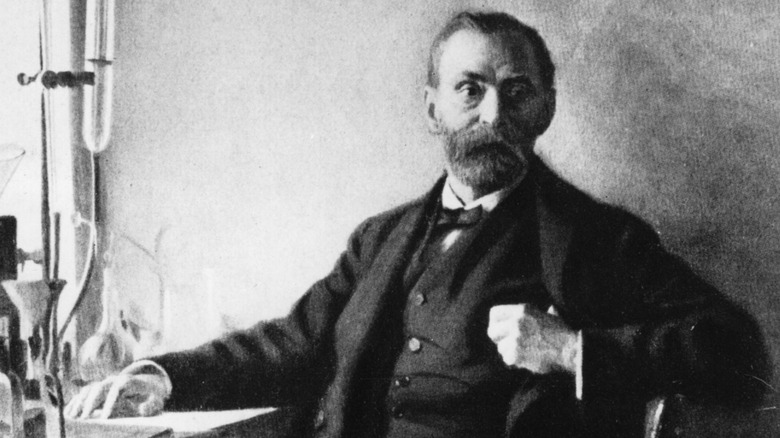The Surprising Way A Prewritten Obituary Might Have Inspired The Nobel Prize
It's only natural to wonder what people will remember about you after you die. Some major public figures might spend a fair bit of time worrying about their legacy, and Alfred Nobel was no exception. The Swedish industrialist and engineer was certainly accomplished, having accrued a personal fortune over his lifetime of inventing and manufacturing explosives and munitions. Following in his father's footsteps, Nobel first worked in his father's factories manufacturing military equipment, but truly made a name for himself when he invented dynamite, according to Britannica. Nobel then opened a series of factories across Europe to manufacture the powerful product, while he continued to invent other, more powerful explosives, like blasting gelatin and ballistite.
However, as he got older, Nobel, like many other successful people, began to wonder about how he would be remembered once he had passed away. But while most people simply have to make their best guess as to what kind of legacy they will leave behind, Alfred Nobel, by pure accident, actually got the chance to see his for himself, and he didn't exactly like what he saw.
A French newspaper mistakenly published Alfred Nobel's obituary after his brother died
In 1888, Alfred Nobel's obituary was published in a French newspaper. However, there was just one key problem with this obituary: Alfred Nobel wasn't dead at the time. It was actually his older brother, Ludvig, who had passed away from a heart attack in Cannes, France. The obituary writer had somehow mistaken the two, and the obituary for the wrong brother was published, according to History. As a result, Alfred Nobel got the rare opportunity to read his own obituary.
The obituary was brutal, ripping into Alfred Nobel for having devoted his life only to developing violent weaponry and explosives that would maim and murder other human beings. "The merchant of death is dead," the obituary reported (via Britannica). Nobel, realizing this would be how history would remember him forever, quickly set about concocting a plan to change that. At the age of 62, he signed a new last will and testament, leaving almost all of his estate, which was worth 31 million Swedish kroner, or the equivalent of $265 million in today's money, to the formation of the five Nobel prizes, according to The Nobel Prize website.
The first Nobel Prize was awarded five years after Alfred Nobel's death
When Alfred Nobel died in 1896, his will caused quite a stir. Nobel had written that all of his assets were "to be disbursed as follows: the capital, converted to safe securities by my executors, is to constitute a fund, the interest on which is to be distributed annually as prizes to those who, during the preceding year, have conferred the greatest benefit to humankind" (via The Nobel Prize). A prize would honor the most accomplished person in each field: physics, chemistry, physiology or medicine, literature, and peace.
He further stipulated that "when awarding the prizes, no consideration be given to nationality, but that the prize be awarded to the worthiest person, whether or not they are Scandinavian." Predictably, Nobel's family was none too happy about the will, nor were members of the Swedish royal family, who were not pleased that the prize would be open to candidates from all over the world, according to Ozy. It took five years for Nobel's final wishes to be fulfilled, and the first Nobel Prizes were awarded in 1901. As of 2021, the Nobel Prize has been awarded to 943 individuals and 25 organizations from 80 different countries (via The Nobel Prize).


